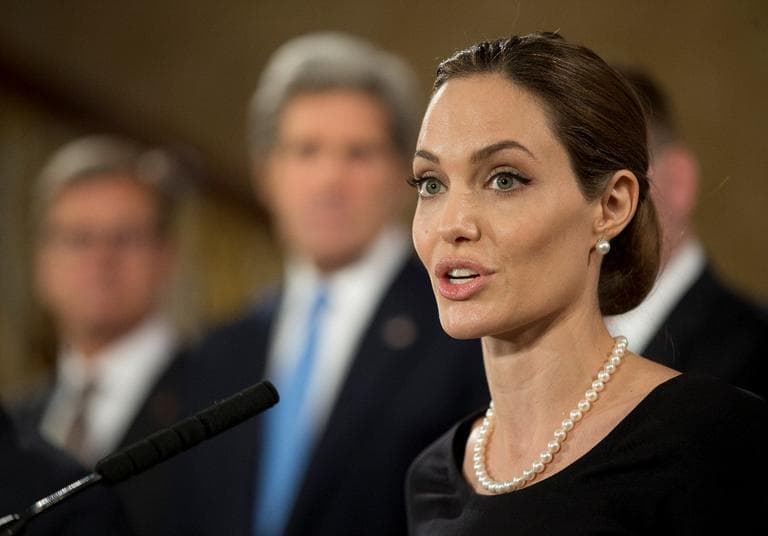Advertisement
Who Should Get The Gene Test For Breast Cancer?
Resume
Movie star Angela Jolie, 37, who's also a mother of six and a United Nations special envoy, has gone public about her decision to have a BRCA gene test and undergo a double mastectomy and reconstruction as a preventative measure.
Removal of the breasts for patients who carry a "faulty" BRCA1 or BRCA2 gene greatly reduces the risk for cancer.
Jolie's op-ed in The New York Times raises questions for all women. How common is the gene mutation? Does having it mean you'll have cancer? Who should be tested?
"For a BRCA1 or 2 carrier, we anticipate that the risk of them developing a breast cancer falls in the range of 56 to 87 percent."
Dr. Judy Boughey
Among those applauding Jolie's op-ed is 40-year-old breast cancer patient Marla Dansky. She also has the BRCA gene mutation and will undergo a double mastectomy at Duke University Medical Center, as well as have her ovaries and cervix removed.
"The more people talk about it, and the more people raise awareness about it, the bigger the community of people who are getting taken care of and who are surviving and living long lives," Dansky told Here & Now's Robin Young.
Dansky's younger sister, her mother and her aunts all have been diagnosed with breast cancer. Her mother's doctors advised her to get a double mastectomy and hysterectomy. Dansky insisted on having mammograms before considering the procedures. In the course of those tests, she discovered she had cancer in her breast and lymph nodes. She then got the BRCA gene test.
"In light of the results that I was BRCA1 positive, I made the decision to go with a double mastectomy and reconstruction," Dansky said. "Also at that time, [I] was introduced to a separate oncology team that deals with ovaries, Fallopian tubes, cervical issues and also removal of the uterus."
Dr. Judy Boughey, associate professor of surgery at the Mayo Clinic, says anywhere from one in 500 women to one in 800 women carry mutations in the BRCA1 or BRCA2 gene.
"For a BRCA1 or 2 carrier, we anticipate that the risk of them developing a breast cancer falls in the range of 56 to 87 percent," Boughey said. "A double mastectomy decreases your risk of developing breast cancer by about 90 to 95 percent."
Women referred for genetic testing are ones who have family history of breast cancer or ovarian cancer, Boughey said. The BRCA gene test costs about $4,000 and the majority of insurance companies cover it — if there is a family history.
The Mayo Clinic offers this guidance to women and men:
You might be at increased risk of having a BRCA gene mutation — and a candidate for BRCA gene testing — if you have:
- A personal history of breast cancer diagnosed at a young age (premenopausal), breast cancer affecting both breasts (bilateral breast cancer), or both breast and ovarian cancers
- A personal history of ovarian cancer and a close relative with ovarian cancer or premenopausal breast cancer or both
- A history of breast cancer at a young age in two or more close relatives, such as your parents, siblings and children
- A male relative with breast cancer
- A family member who has both breast and ovarian cancers
- A family member with bilateral breast cancer
- Two or more relatives with ovarian cancer
- A relative with a known BRCA1 or BRCA2 mutation
- Ashkenazi (Eastern European) Jewish ancestry, with a close relative who has breast or ovarian cancer
- Ashkenazi Jewish ancestry and a personal history of ovarian cancer
Do you think more women will start getting tested for genes related to breast cancer, as a result of Angelina Jolie's op-ed? Tell us on our Facebook page or in the comments.
Guests:
- Marla Dansky, breast cancer patient.
- Dr. Judy Boughey, breast cancer surgeon.
This segment aired on May 14, 2013.